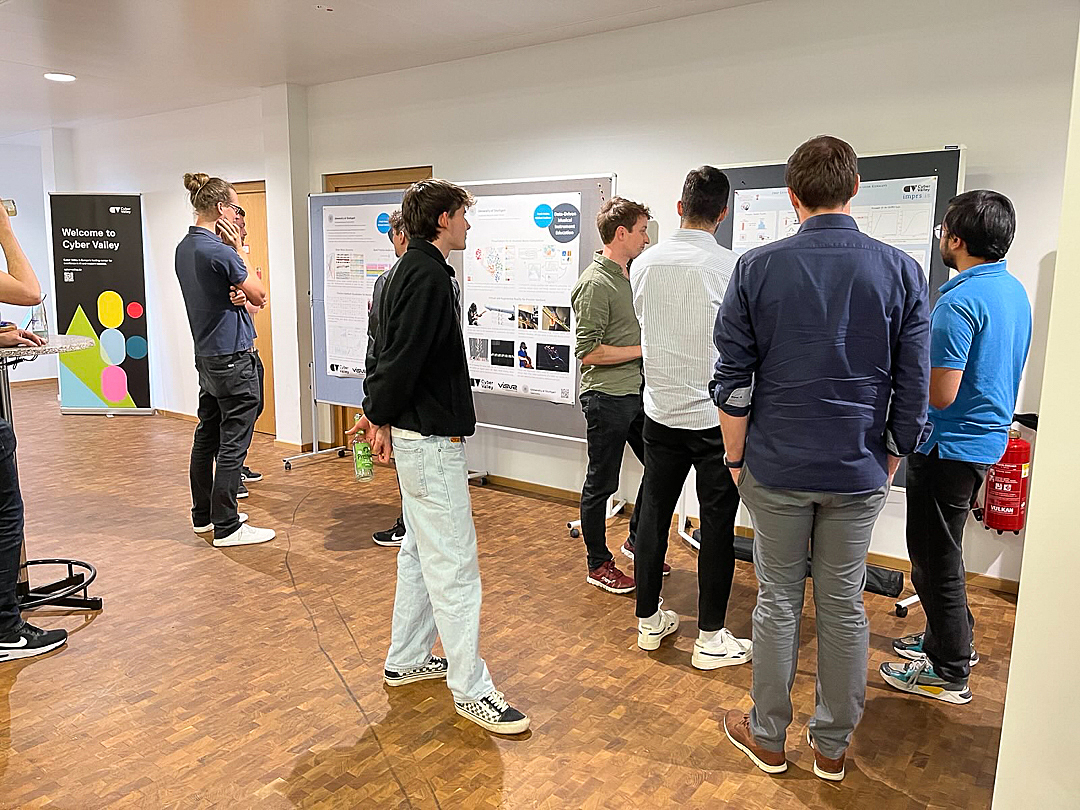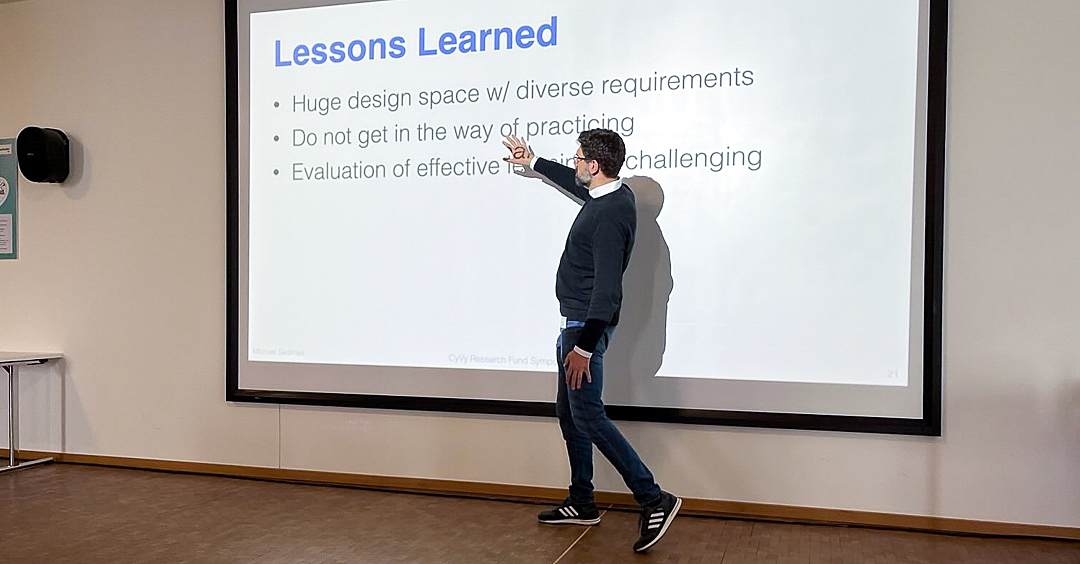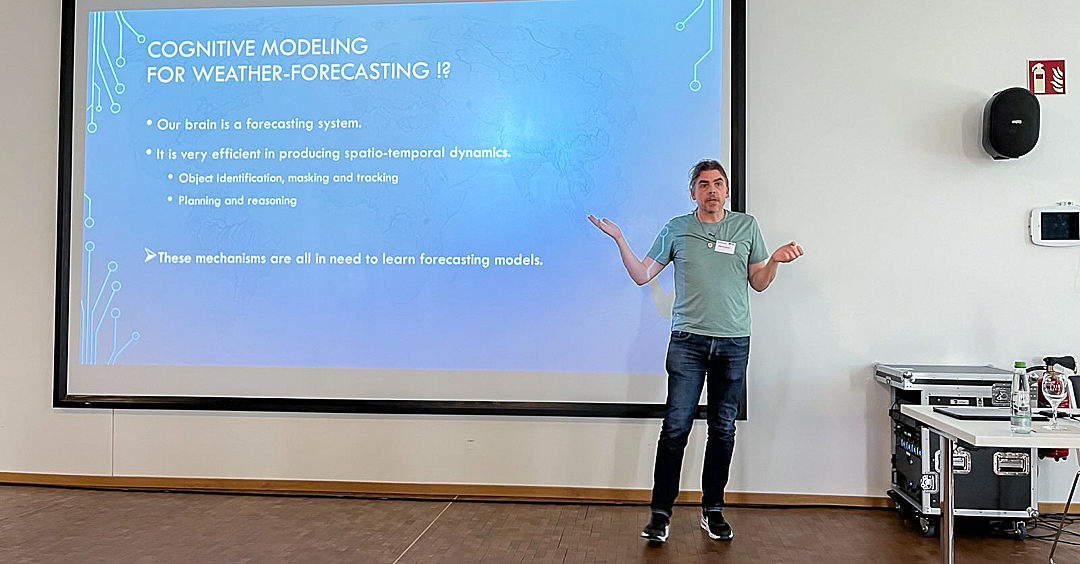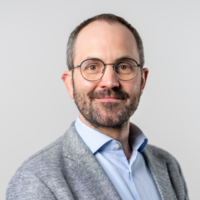The Cyber Valley Research Fund Symposium 2025
Showcasing cutting-edge basic research from the Cyber Valley Innovation Campus

On May 13, the Cyber Valley Research Fund Symposium took place at the Fraunhofer Institute for Manufacturing Engineering and Automation IPA in Stuttgart. The symposium showcased research projects supported by the Cyber Valley Research Fund. The fund, totaling five million euros, was created through the contributions of six of Cyber Valley’s founding partners: Amazon, BMW, Bosch, IAV, Porsche, and ZF. It provided scientists from the Cyber Valley Innovation Campus with resources and support for their cutting-edge research.
Cyber Valley Research Fund Projects
The symposium began with a presentation by Dmitry Kobak (Hertie Institute for AI in Brain Health, University of Tübingen) on “Contrastive Learning for Dimensionality Reduction and Visualization of Transcriptomic Data.” He highlighted a new method for visualizing image data using self-supervised learning that combines contrastive learning with neighbor embedding to create clear 2D visualizations.
Tian Qiu (Professor at the Dresden University of Technology and Head of Smart Technologies for Tumor Therapy, German Cancer Research Center Dresden) gave the next presentation: “The Cyber-Physical Twin of Human Organs”. His research created digital and physical replicas of human organs that combine the benefits of physical and digital models, which make it easier to collect, analyze, and model difficult-to-obtain medical data.

Fabian Sinz (Professor of Machine Learning, University of Göttingen) presented the third Cyber Valley Research Fund project: “Mechanisms of Representation Transfer”. Sinz discussed the transference of strong visual processing skills between artificial neural networks and biological ones.
Fraunhofer covers robotics and GenAI
The Cyber Valley Research Fund also welcomed two talks from Fraunhofer IPA and Fraunhofer IAO. Werner Kraus (Head of Robot and Assistive Systems and Leader of the AI Innovation Center, Fraunhofer IPA) presented a review of the European Robotics Forum that took place in March 2025 in Stuttgart – the first time the conference has happened in Germany. Chandan Kumar (Team Leader of Interaction Design and Technologies at Fraunhofer Institute for Industrial Engineering IAO) then gave insights on “Smart Innovation with LLM-Powered Agents”.

Cyber Valley Research Fund Projects - (Flight) Robotics
Two projects led by Aamir Ahmad (Tenure-track Professor of Flight Robotics and Deputy Director of Research at the Institute of Flight Mechanics and Controls, University of Stuttgart, and Research Group Leader at the Max Planck Institute for Intelligent Systems) came next. Ahmad’s first project “WildCap – Autonomous Animal Motion Capture for Wildlife Conservation” developed autonomous flying robots that monitor wild animals using onboard sensors and wireless communication. He highlighted that AI methods enable them to detect, track, and interpret behavior, and how they adapt based on monitoring accuracy.
Christian Gall (Research Associate at the University of Stuttgart’s Institute of Flight Mechanics and Controls) is part of Ahmad’s research group and led the second project “Decision Making for Environmental Energy Exploitation with Small Aircraft”. Gall introduced a learning approach that permits aircraft to autonomously detect and exploit thermal updrafts.
Cyber Valley Research Fund Industry Partners
Four representatives from Cyber Valley’s industry partners shared their research in the first afternoon session. Mohsen Kaboli (Head of AI, Robotics and Cognitive Vehicle Research at BMW Group, and Professor of Embodied AI, Robotics, and Tactile Intelligence at the Eindhoven University of Technology) spoke about “Embodied Interactive Visuo-Tactile Perception and Learning for Robotic Grasp and Manipulation”. Maximilian Rabus (Product Manager and Data Strategist at Porsche AG) subsequently presented on “Data Fuels Performance: Insights into Porsche’s Data-Driven Development”, followed by Alexander Joos (Senior Vice President of Digital Solutions Powertrain at IAV GmbH) on “The Modern Development in the Age of AI”.
Cyber Valley Research Projects from Clusters of Excellence
The afternoon continued with a talk from Paul-Christian Bürkner (Professor of Computational Statistics at TU Dortmund University) on “Meta-uncertainty in Bayesian model comparison”. He highlighted the methods to quantify meta-uncertainty – the uncertainty over model probabilities in Bayesian model comparison – using theory and simulations to better understand the limits of scientific inference.

Next, Nicolas Kubail-Kalousdian (Institute of Computational Design and Construction, University of Stuttgart) gave his talk “Task and Motion Planning for Collaborative Robotic Construction with Irregular Materials”. His research developed a robotic construction system that combines reinforcement learning and logic-geometric programming to autonomously build with irregular, renewable materials like bamboo. The system showcases a sustainable, adaptive approach to low-carbon construction using mobile robots and intelligent material handling.
Cyber Valley Research Fund Projects - Specific research areas
In the symposium’s concluding session, Michael Sedlmair (Professor for Augmented Reality and Virtual Reality, University of Stuttgart) began by exploring how AI can support musical creativity. In “InstruData – Data-Driven Musical Instrument Education” he discussed how his research project used AI to augment creative processes through human-centered design.
Next, Martin Butz (Professor in Cognitive Modeling, University of Tübingen) discussed spatiotemporal forecasting models in “Neural Generative Weather Forecasting”. This project developed deep-learning models for forecasting spatiotemporal phenomena, ranging from local precipitation to global weather patterns. It utilized physics-informed, modular architectures and tailored data structures to improve prediction accuracy across diverse environmental scenarios.

In the final presentation, Falk Lieder (Assistant Professor of Psychology and Director of the Rational Altruism Lab, University of California Los Angeles) explained how his research has improved human decision-making. His project, “A Scalable Machine Learning Approach to Improving Human Decision Making”, developed computational tools which optimize decision-making strategies that outperform human intuition in areas like education, health, and finance. By integrating these strategies into educational software, they improved the quality of users’ decisions, resulting in smarter, more informed choices in real-world scenarios.
The Cyber Valley Research Fund Symposium demonstrated the research excellence in AI and modern robotics generated through the support of Cyber Valley’s founding industry partners. The day was rounded off by a lively networking session, which included discussions on open research questions and future collaborations.
Related Articles

Cyber Valley Research Fund project optimizes focus and pr...

Cyber Valley Research Fund drives advancements in soft ro...

